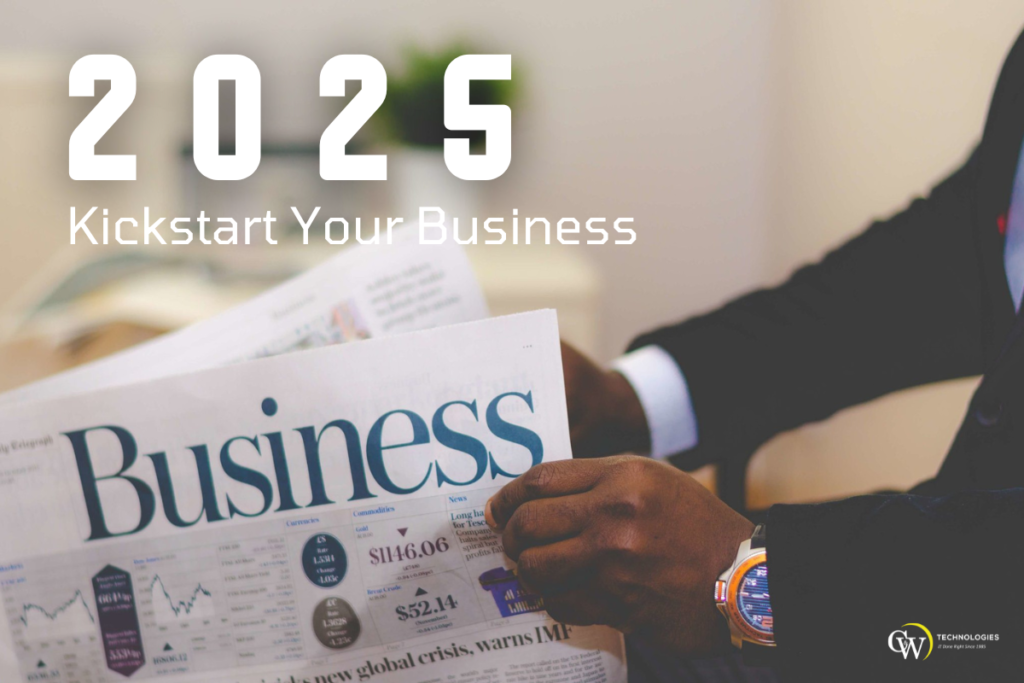The start of a new year is the perfect time for businesses to reflect on their past achievements and set goals for the future. In today’s fast-paced digital landscape, it is crucial for companies to stay ahead of the curve and adopt strategic IT goals to enhance productivity and security. With 2025 arriving, it is important for businesses to take note of emerging technology trends that will shape the next decade. In this article, we’ll explore the technology trends in 2025 that every organization should be aware of in order to kickstart their success in the upcoming years. Don’t get left behind! Keep reading to learn effective and efficient ways that technology trends of the future can positively impact your organization and its success.
Why is it Important to Stay Relevant in the Business World?
The world of business is constantly evolving and changing, with new technologies and trends emerging every day. In order to stay competitive and relevant in the market, businesses need to continuously adapt and embrace these changes. This not only allows them to keep up with their competitors but also helps them to improve their overall productivity and efficiency.
Furthermore, staying relevant in the business world also means keeping up with customer expectations and demands. As technology advances, customers expect establishments to provide fast, efficient, and personalized services at all times. By adopting the latest technology trends, businesses can meet these expectations and enhance their customer experience.
How to Stay Ahead of Business Trends
To stay ahead of the trends, it is important for organizations to regularly assess their IT goals and strategies. This involves constantly researching and keeping up with the latest technology developments in their industry. Additionally, it is crucial to have a forward-thinking mindset and be open to implementing new technologies that can improve processes and operations.
Moreover, collaborating with other businesses or experts in the field can also provide valuable insights and knowledge about emerging trends. It’s important for businesses to network and attend events like conferences, workshops, and seminars to stay informed about the latest advancements in technology.
Business Strategies and Business Operations: What are they?
Business strategies refer to a set of plans and actions that a company takes to achieve their long-term goals. These goals could include increasing revenue, expanding into new markets, or improving customer satisfaction. On the other hand, operations refer to the day-to-day activities and processes that a company undertakes to ensure its smooth functioning.
Both strategies and operations in organizations are closely intertwined with technology in today’s digital landscape. The right IT strategies can significantly improve operations, resulting in increased efficiency, productivity, and ultimately achieving strategic goals.
Artificial Intelligence for the Future
Artificial Intelligence, (AI), has been making waves in the world for several years now, and it will continue to do so in 2025. AI technology involves using computer systems to perform tasks that normally require human intelligence, such as problem-solving, decision-making, and language recognition.
In the next decade, we can expect AI to become even more advanced and integrated into various industries. This means increased automation of processes and operations, resulting in higher efficiency and cost savings. Additionally, AI can also provide valuable insights through data analysis, helping businesses make better decisions.
Cybersecurity: A Growing Concern
As technology continues to advance, so do the risks of cyberattacks and data breaches. In 2025, businesses will need to prioritize cybersecurity measures to protect their sensitive information and maintain trust with their customers.
With the rise of remote work and cloud-based systems, companies must invest in secure networks, encrypted communication channels, and regular security audits. Additionally, training employees on safe online practices can also significantly reduce the chances of a cyberattack.
The Internet of Things (IoT): Connecting Everything
The Internet of Things (IoT) refers to the interconnectedness of physical objects through embedded sensors and internet connectivity. This presents a huge opportunity for businesses to collect and analyze vast amounts of data, leading to improved decision-making and customer experiences.
Additionally, IoT can also streamline operations by automating processes such as inventory management, supply chain tracking, and predictive maintenance. It is crucial for businesses to stay informed about the latest advancements in IoT technology to leverage its potential benefits.
Extended Reality (XR): The Future of Customer Experience
Extended Reality, (XR), refers to the use of technology to create fully immersive experiences for users, encompassing virtual reality, augmented reality, and mixed reality. In businesses, this technology has immense potential in enhancing customer experience.
For example, businesses can use AR technology to provide customers with a virtual try-on experience for products or use VR technology to showcase their services in a realistic and engaging manner. By incorporating XR into their operations, businesses can differentiate themselves from competitors and offer innovative experiences that keep customers engaged and loyal.
Block Chain Technology: Ensuring Transparency and Trust
Block Chain technology is a decentralized system that allows for secure and transparent record-keeping of transactions. In 2025, we can expect to see more businesses utilizing this technology to improve trust with their customers.
Block Chain can be used in various industries, including supply chain management, finance, and healthcare. By providing an immutable record of all transactions, it ensures transparency and reduces the chances of fraud or errors. This technology has the potential to revolutionize how businesses conduct their operations and interact with customers.
Who is C&W Technologies?
C&W Technologies is a leading IT solutions provider that helps businesses stay ahead of the latest technology trends. We offer a wide range of services, including network security, cloud computing, data management, and digital transformation consulting. Our team of experts stays up to date with the latest advancements in technology to provide our clients with cutting-edge solutions that drive their success.
At C&W Technologies, we believe in building strong partnerships with our clients by understanding their goals and finding innovative ways to achieve them using technology.
So, businesses must continue to adapt and evolve their strategies and operations to keep up with the ever-changing technological landscape for long-term success. By staying informed about emerging trends and working with trusted technology partners like C&W Technologies, businesses can position themselves for growth and success in 2025 and beyond. So, do not wait any longer! Start preparing for the future today. Get in touch with us at C&W Technologies to see how we can help you stay ahead of the curve. Let’s make 2025 a year of success together!
Contact Us
Don’t miss out on the opportunity to future-proof your organization and stay ahead of the competition. As technology continues to advance at a rapid pace, it’s crucial for businesses to embrace these advancements and incorporate them into their operations. Please fill out the following form for assistance or click here to contact us.
Frequently Asked Questions (FAQ’s):
Q: How does consumer behavior affect businesses?
A: Consumer behavior plays a crucial role in the success of businesses. Understanding the needs, wants, and preferences of consumers is essential for developing effective marketing strategies and delivering products or services that meet their expectations.
Q: What is renewable energy?
A: Renewable energy refers to sources of energy that are naturally replenished, such as solar power, wind power, hydroelectricity, and geothermal heat. These sources do not deplete over time and have minimal impact on the environment compared to non-renewable sources like fossil fuels.
Q: How can sustainable practices benefit businesses?
A: Implementing sustainable practices can have several benefits for businesses, including cost savings through energy efficiency, improved reputation and brand image, and a competitive advantage as more consumers prioritize environmentally responsible companies.
Q: What are some business trends for 2025?
A: Some business trends predicted for 2025 include increased adoption of artificial intelligence (AI) technology, continued growth of e-commerce and online shopping, and a focus on sustainability and ethical business practices.
Q: How does AI adoption impact businesses?
A: AI adoption can have a significant impact on businesses by streamlining processes, improving decision-making capabilities, and enhancing customer experiences. It also has the potential to create new job opportunities in industries such as data science and machine learning.
Q: What are some common AI tools used in business?
A: Some common AI tools used in business include chatbots for customer service, predictive analytics for data analysis and forecasting, and natural language processing for communication and document management.
Q: What significant changes can we expect in the year ahead?
A: In 2025, we can expect to see advancements in technologies such as XR (extended reality), block chain, and AI, as well as a continued focus on sustainability and ethical business practices. The COVID-19 pandemic may also have long-lasting effects on how businesses operate and interact with customers.
Q: How can virtual and augmented reality enhance customer experiences?
A: Virtual and augmented reality technology can provide immersive and interactive experiences, allowing businesses to engage with customers in new and innovative ways. This can lead to increased customer satisfaction, brand loyalty, and ultimately, business success. So, it is essential for businesses to consider incorporating these technologies into their operations moving forward.
Q: What is a business model?
A: A business model refers to the strategy and structure used by a company to generate revenue and sustain its operations. It includes elements such as target market, value proposition, revenue streams, and cost structure.
Q: How does economic uncertainty affect businesses?
A: Economic uncertainty can impact businesses in various ways, such as changes in consumer spending habits, fluctuations in supply and demand, and market volatility. It requires businesses to be agile and adaptable to navigate through uncertain times successfully.
Q: How have mobile devices changed the way we do business?
A: Mobile devices have revolutionized the way we do business by providing constant connectivity and access to information on the go. It has enabled businesses to communicate with customers, manage operations, and make data-driven decisions more efficiently and effectively. So, mobile devices have become an essential tool for businesses in today’s digital age.


